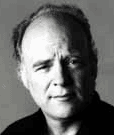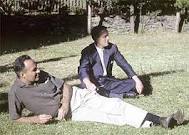RPCVs trying to tell the Peace Corps story — not if HQ can stop them
The first Peace Corps film was done by RPCVs from Nigeria, David Schickele and Roger Landrum, both Nigeria 1 (1962-64) PCVs. The film Give Me A Riddle was shot in 1966.
The producer and director, the late David Schickele, said about making the film,
Nigeria became an independent country in 1960. In 1967 it was torn apart by civil war. Between these two events Nigeria enjoyed a kind of golden age, full of cultural ferment and cross-tribal fertilization. Every kid out of the village was writing the great Nigerian novel. A spirit of great hope prevailed through the land. Give Me A Riddle is about this golden age, seen through the eyes of ex-Peace Corps Volunteer — Roger Landrum — returning to his host country a couple of years after his Peace Corps service as a teacher at the University of Nigeria. The film follows Roger as he looks up his former students in Nigeria. Shot in 1966, the film is a time capsule of a Nigeria and the Peace Corps both in the rambunctious bloom of youth.
But as Roger Landrum recalled in an article published on our PeaceCorpsWriters site in 2001:
 The Peace Corps was jittery about the proposed project [that was ultimately labeled “Made in Nigeria for the Peace Corps by David Schickele”]. In 1965, David was unknown, at the beginning of a career as an independent filmmaker and musician. These were still the early years of the Peace Corps, and facing a lot of Congressional skepticism, the agency was sensitive about its image both in Washington and with the American public. This project did not fit the preferred style of hiring a powerful PR firm to shape the Peace Corps message and conducting recruitment campaigns under tight agency control. But as things often happened in those days, Harris Wofford got behind the project and convinced Sargent Shriver to take a chance, despite strong objections from others within the Peace Corps.
The Peace Corps was jittery about the proposed project [that was ultimately labeled “Made in Nigeria for the Peace Corps by David Schickele”]. In 1965, David was unknown, at the beginning of a career as an independent filmmaker and musician. These were still the early years of the Peace Corps, and facing a lot of Congressional skepticism, the agency was sensitive about its image both in Washington and with the American public. This project did not fit the preferred style of hiring a powerful PR firm to shape the Peace Corps message and conducting recruitment campaigns under tight agency control. But as things often happened in those days, Harris Wofford got behind the project and convinced Sargent Shriver to take a chance, despite strong objections from others within the Peace Corps.
At the time, I was a Peace Corps employee, a program officer in the Division of Training, and I soon got a taste of the obstacles David and Harris had overcome. In preparation for our filmmaking party’s departure, my passport had to be sent, with Travel Orders, through the General Counsel’s office for final approval. There they were confiscated and declared “lost.” It took a confrontational hubbub to pry them out only a short time before the party’s scheduled flight to Nigeria. That was just the beginning of our troubles.
Making a movie about the Peace Corps historically has been and continues to be a problem if you choose to work with the agency. The problem really is twofold: the bureaucrats in Washington who have never been overseas (except perhaps to London and Paris — thought today they might be too afraid to go to Paris), and have no understanding of the Peace Corps experience; and, particularly disheartening, some overseas staff who are RPCVs and are terrified about anyone — especially another RPCV — doing a film about the agency, or writing about their experience, or even just going to a reunion of RPCVs, as if it someway might affect their job security.

Peace Corps HQ
I realize that these kinds of problems do happen in the real world, with real people, and they do worry certain Peace Corps bureaucrats who are more concerned about upsetting Washington or losing their pensions than recruiting new PCVs or doing a good job overseas. For them they do not see that helping produce a film that tells the real story of the Peace Corps — the many great things RPCVs are doing with their lives, yesterday and today and tomorrow — is good for the Peace Corps. It seems that regardless of the administration, regardless of whether they are PCVs or not, some Peace Corps staff members turn into gutless wonders once they clear security at 1111 20th Street NW and step inside the closed world of Peace Corps HQ.
NOW we hear of the making of a terrific Peace Corps experience film — in China!
 To tell a “Peace Corps story” it takes the Chinese film maker, Lu Chuan, who is now directing River Town: Two Years On The Yangtze. This film, based on the highly praised memoir by Peter Hessler (China 1996-98), doesn’t have anything to do with Peace Corps HQ. Lu Chuan is making his film in China. So ask yourself: Who has the control of the press? China or the Peace Corps? Go figure.
To tell a “Peace Corps story” it takes the Chinese film maker, Lu Chuan, who is now directing River Town: Two Years On The Yangtze. This film, based on the highly praised memoir by Peter Hessler (China 1996-98), doesn’t have anything to do with Peace Corps HQ. Lu Chuan is making his film in China. So ask yourself: Who has the control of the press? China or the Peace Corps? Go figure.
There have been a few films about the Peace Corps, written, produced and directed by RPCVs, but they (fortunately) did not try to work with the agency.
(It is no wonder Trump and Sanders are filling auditoriums with their rhetoric about political types in Wahington. It’s not just RPCVs who are fed up with limp toast bureaucrats.)
Remember what Roger Landrum said about his film back in 1966?
This project — Give Me A Riddle — did not fit the preferred style of hiring a powerful PR firm to shape the Peace Corps message and conducting recruitment campaigns under tight agency control. But as things often happened in those days, Harris Wofford got behind the project and convinced Sargent Shriver to take a chance, despite strong objections from others within the Peace Corps.
Those were the days. Where are Harris and Sarge when we need them?


Some always would rather talk around while others “walk the walk”. Your guys walk, talk, tell just like your ‘daddy’ Chaucer .